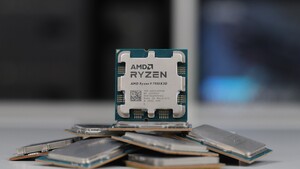sanjiblubbl
Ensign
- Registriert
- Jan. 2012
- Beiträge
- 215
Hey Leute,
ich hatte heute ein paar Daten von meinem Server auf meinen Rechner (Win 7) kopieren wollen und dabei festgestellt, dass ich mit ca. 10 mb/s kopiert hatte. Normalerweise kopiere ich zwischen 80-110 mb/s auf die PC's/ Laptop's.
Schreiben ist kein problem, da habe ich im durschnitt 97 mb/s.
Ich habe es an mehreren Rechnern via Samba getestet. 2 PC's & 3 Laptop's (davon einer mit Kubuntu)
Ich hatte die letzten Tage nur ein paar Paketupdates gemacht und ein System upgrade (kleineres, war zuvor schon 13.10)
Daraufhin hatte ich einige Speed Test über Netzlaufwerke gemacht. Leider genauso ernüchternd, mit ca. 8-10 mb/s lesen und ca. 120 mb/s schreiben.(siehe bild unten)

Hier ein Auszug via Konsole mit HDParm
sollte eigentlich alles passen.
ich habe auch bereits gegoogelt und gefunden dass die " socket options" auskommentieren soll. Das hat leider auch nichts gebracht.
Samba neu zu installieren hat ebenfalls nichts gebracht.
Firewall ist keine aktiviert.
Wenn ich den Samba Server über Webmin neustarten will bekomme ich ebenfalls einen komischen fehler...
Ich füge ebenfalls mal meine smb.conf bei
Hat jemand eine Idee oder ähnliche Probleme?
Grüße
Edit:// Über einen FTP Zugang erreiche ich leider nur ähnliche Datenraten
ich hatte heute ein paar Daten von meinem Server auf meinen Rechner (Win 7) kopieren wollen und dabei festgestellt, dass ich mit ca. 10 mb/s kopiert hatte. Normalerweise kopiere ich zwischen 80-110 mb/s auf die PC's/ Laptop's.
Schreiben ist kein problem, da habe ich im durschnitt 97 mb/s.
Ich habe es an mehreren Rechnern via Samba getestet. 2 PC's & 3 Laptop's (davon einer mit Kubuntu)
Ich hatte die letzten Tage nur ein paar Paketupdates gemacht und ein System upgrade (kleineres, war zuvor schon 13.10)
Daraufhin hatte ich einige Speed Test über Netzlaufwerke gemacht. Leider genauso ernüchternd, mit ca. 8-10 mb/s lesen und ca. 120 mb/s schreiben.(siehe bild unten)

Hier ein Auszug via Konsole mit HDParm
Code:
/dev/sda:
Timing O_DIRECT cached reads: 752 MB in 2.00 seconds = 375.62 MB/sec
Timing O_DIRECT disk reads: 1380 MB in 3.00 seconds = 459.31 MB/sec
/dev/sdb:
Timing O_DIRECT cached reads: 386 MB in 2.01 seconds = 192.25 MB/sec
Timing O_DIRECT disk reads: 554 MB in 3.00 seconds = 184.42 MB/sec
/dev/sdc:
Timing O_DIRECT cached reads: 384 MB in 2.01 seconds = 191.23 MB/sec
Timing O_DIRECT disk reads: 534 MB in 3.01 seconds = 177.66 MB/sec
/dev/sdd:
Timing O_DIRECT cached reads: 236 MB in 2.01 seconds = 117.66 MB/sec
Timing O_DIRECT disk reads: 364 MB in 3.01 seconds = 120.83 MB/sec
/dev/sde:
Timing O_DIRECT cached reads: 242 MB in 2.01 seconds = 120.11 MB/sec
Timing O_DIRECT disk reads: 494 MB in 3.00 seconds = 164.47 MB/sec
/dev/sdf:
Timing O_DIRECT cached reads: 686 MB in 2.00 seconds = 342.22 MB/sec
Timing O_DIRECT disk reads: 378 MB in 3.01 seconds = 125.56 MB/sec
/dev/sdg:
Timing O_DIRECT cached reads: 682 MB in 2.00 seconds = 340.95 MB/sec
Timing O_DIRECT disk reads: 386 MB in 3.00 seconds = 128.49 MB/secsollte eigentlich alles passen.
ich habe auch bereits gegoogelt und gefunden dass die " socket options" auskommentieren soll. Das hat leider auch nichts gebracht.
Samba neu zu installieren hat ebenfalls nichts gebracht.
Firewall ist keine aktiviert.
Wenn ich den Samba Server über Webmin neustarten will bekomme ich ebenfalls einen komischen fehler...
Code:
Fehlgeschlagen den Samba-Server neuzustarten : /etc/init.d/samba start || (/etc/init.d/nmbd start ; /etc/init.d/smbd start) fehlgeschlagenIch füge ebenfalls mal meine smb.conf bei
Code:
#
# Sample configuration file for the Samba suite for Debian GNU/Linux.
#
#
# This is the main Samba configuration file. You should read the
# smb.conf(5) manual page in order to understand the options listed
# here. Samba has a huge number of configurable options most of which
# are not shown in this example
#
# Some options that are often worth tuning have been included as
# commented-out examples in this file.
# - When such options are commented with ";", the proposed setting
# differs from the default Samba behaviour
# - When commented with "#", the proposed setting is the default
# behaviour of Samba but the option is considered important
# enough to be mentioned here
#
# NOTE: Whenever you modify this file you should run the command
# "testparm" to check that you have not made any basic syntactic
# errors.
# A well-established practice is to name the original file
# "smb.conf.master" and create the "real" config file with
# testparm -s smb.conf.master >smb.conf
# This minimizes the size of the really used smb.conf file
# which, according to the Samba Team, impacts performance
# However, use this with caution if your smb.conf file contains nested
# "include" statements. See Debian bug #483187 for a case
# where using a master file is not a good idea.
#
#======================= Global Settings =======================
[global]
## Browsing/Identification ###
# Change this to the workgroup/NT-domain name your Samba server will part of
workgroup = WORKGROUP
# server string is the equivalent of the NT Description field
server string = %h server (Samba, Ubuntu)
# Windows Internet Name Serving Support Section:
# WINS Support - Tells the NMBD component of Samba to enable its WINS Server
# wins support = no
# WINS Server - Tells the NMBD components of Samba to be a WINS Client
# Note: Samba can be either a WINS Server, or a WINS Client, but NOT both
; wins server = w.x.y.z
# This will prevent nmbd to search for NetBIOS names through DNS.
dns proxy = no
# What naming service and in what order should we use to resolve host names
# to IP addresses
; name resolve order = lmhosts host wins bcast
#### Networking ####
# The specific set of interfaces / networks to bind to
# This can be either the interface name or an IP address/netmask;
# interface names are normally preferred
; interfaces = 127.0.0.0/8 eth0
# Only bind to the named interfaces and/or networks; you must use the
# 'interfaces' option above to use this.
# It is recommended that you enable this feature if your Samba machine is
# not protected by a firewall or is a firewall itself. However, this
# option cannot handle dynamic or non-broadcast interfaces correctly.
; bind interfaces only = yes
#### Debugging/Accounting ####
# This tells Samba to use a separate log file for each machine
# that connects
log file = /var/log/samba/log.%m
# Cap the size of the individual log files (in KiB).
max log size = 1000
# If you want Samba to only log through syslog then set the following
# parameter to 'yes'.
# syslog only = no
# We want Samba to log a minimum amount of information to syslog. Everything
# should go to /var/log/samba/log.{smbd,nmbd} instead. If you want to log
# through syslog you should set the following parameter to something higher.
syslog = 0
# Do something sensible when Samba crashes: mail the admin a backtrace
panic action = /usr/share/samba/panic-action %d
####### Authentication #######
# "security = user" is always a good idea. This will require a Unix account
# in this server for every user accessing the server. See
# /usr/share/doc/samba-doc/htmldocs/Samba3-HOWTO/ServerType.html
# in the samba-doc package for details.
# security = user
# You may wish to use password encryption. See the section on
# 'encrypt passwords' in the smb.conf(5) manpage before enabling.
encrypt passwords = true
# If you are using encrypted passwords, Samba will need to know what
# password database type you are using.
passdb backend = tdbsam
obey pam restrictions = yes
# This boolean parameter controls whether Samba attempts to sync the Unix
# password with the SMB password when the encrypted SMB password in the
# passdb is changed.
unix password sync = yes
# For Unix password sync to work on a Debian GNU/Linux system, the following
# parameters must be set (thanks to Ian Kahan <<kahan@informatik.tu-muenchen.de> for
# sending the correct chat script for the passwd program in Debian Sarge).
passwd program = /usr/bin/passwd %u
passwd chat = *Enter\snew\s*\spassword:* %n\n *Retype\snew\s*\spassword:* %n\n *password\supdated\ssuccessfully* .
# This boolean controls whether PAM will be used for password changes
# when requested by an SMB client instead of the program listed in
# 'passwd program'. The default is 'no'.
pam password change = yes
# This option controls how unsuccessful authentication attempts are mapped
# to anonymous connections
map to guest = bad user
########## Domains ###########
# Is this machine able to authenticate users. Both PDC and BDC
# must have this setting enabled. If you are the BDC you must
# change the 'domain master' setting to no
#
; domain logons = yes
#
# The following setting only takes effect if 'domain logons' is set
# It specifies the location of the user's profile directory
# from the client point of view)
# The following required a [profiles] share to be setup on the
# samba server (see below)
; logon path = \\%N\profiles\%U
# Another common choice is storing the profile in the user's home directory
# (this is Samba's default)
# logon path = \\%N\%U\profile
# The following setting only takes effect if 'domain logons' is set
# It specifies the location of a user's home directory (from the client
# point of view)
; logon drive = H:
# logon home = \\%N\%U
# The following setting only takes effect if 'domain logons' is set
# It specifies the script to run during logon. The script must be stored
# in the [netlogon] share
# NOTE: Must be store in 'DOS' file format convention
; logon script = logon.cmd
# This allows Unix users to be created on the domain controller via the SAMR
# RPC pipe. The example command creates a user account with a disabled Unix
# password; please adapt to your needs
; add user script = /usr/sbin/adduser --quiet --disabled-password --gecos "" %u
# This allows machine accounts to be created on the domain controller via the
# SAMR RPC pipe.
# The following assumes a "machines" group exists on the system
; add machine script = /usr/sbin/useradd -g machines -c "%u machine account" -d /var/lib/samba -s /bin/false %u
# This allows Unix groups to be created on the domain controller via the SAMR
# RPC pipe.
; add group script = /usr/sbin/addgroup --force-badname %g
########## Printing ##########
# If you want to automatically load your printer list rather
# than setting them up individually then you'll need this
# load printers = yes
# lpr(ng) printing. You may wish to override the location of the
# printcap file
; printing = bsd
; printcap name = /etc/printcap
# CUPS printing. See also the cupsaddsmb(8) manpage in the
# cupsys-client package.
; printing = cups
; printcap name = cups
############ Misc ############
# Using the following line enables you to customise your configuration
# on a per machine basis. The %m gets replaced with the netbios name
# of the machine that is connecting
; include = /home/samba/etc/smb.conf.%m
# Most people will find that this option gives better performance.
# See smb.conf(5) and /usr/share/doc/samba-doc/htmldocs/Samba3-HOWTO/speed.html
# for details
# You may want to add the following on a Linux system:
# SO_RCVBUF=8192 SO_SNDBUF=8192
# ;socket options = TCP_NODELAY
# The following parameter is useful only if you have the linpopup package
# installed. The samba maintainer and the linpopup maintainer are
# working to ease installation and configuration of linpopup and samba.
; message command = /bin/sh -c '/usr/bin/linpopup "%f" "%m" %s; rm %s' &
# Domain Master specifies Samba to be the Domain Master Browser. If this
# machine will be configured as a BDC (a secondary logon server), you
# must set this to 'no'; otherwise, the default behavior is recommended.
# domain master = auto
# Some defaults for winbind (make sure you're not using the ranges
# for something else.)
; idmap uid = 10000-20000
; idmap gid = 10000-20000
; template shell = /bin/bash
# The following was the default behaviour in sarge,
# but samba upstream reverted the default because it might induce
# performance issues in large organizations.
# See Debian bug #368251 for some of the consequences of *not*
# having this setting and smb.conf(5) for details.
; winbind enum groups = yes
; winbind enum users = yes
# Setup usershare options to enable non-root users to share folders
# with the net usershare command.
# Maximum number of usershare. 0 (default) means that usershare is disabled.
; usershare max shares = 100
# Allow users who've been granted usershare privileges to create
# public shares, not just authenticated ones
usershare allow guests = yes
#======================= Share Definitions =======================
# Un-comment the following (and tweak the other settings below to suit)
# to enable the default home directory shares. This will share each
# user's home director as \\server\username
;[homes]
; comment = Home Directories
; browseable = no
# By default, the home directories are exported read-only. Change the
# next parameter to 'no' if you want to be able to write to them.
; read only = yes
# File creation mask is set to 0700 for security reasons. If you want to
# create files with group=rw permissions, set next parameter to 0775.
; create mask = 0700
# Directory creation mask is set to 0700 for security reasons. If you want to
# create dirs. with group=rw permissions, set next parameter to 0775.
; directory mask = 0700
# By default, \\server\username shares can be connected to by anyone
# with access to the samba server. Un-comment the following parameter
# to make sure that only "username" can connect to \\server\username
# The following parameter makes sure that only "username" can connect
#
# This might need tweaking when using external authentication schemes
; valid users = %S
# Un-comment the following and create the netlogon directory for Domain Logons
# (you need to configure Samba to act as a domain controller too.)
;[netlogon]
; comment = Network Logon Service
; path = /home/samba/netlogon
; guest ok = yes
; read only = yes
# Un-comment the following and create the profiles directory to store
# users profiles (see the "logon path" option above)
# (you need to configure Samba to act as a domain controller too.)
# The path below should be writable by all users so that their
# profile directory may be created the first time they log on
;[profiles]
; comment = Users profiles
; path = /home/samba/profiles
; guest ok = no
; browseable = no
; create mask = 0600
; directory mask = 0700
[Filme 1]
valid users = markus
write list = markus
path = /shares/HDA_DATA/Filme1
[Filme 2]
valid users = markus
path = /shares/HDB_DATA/Filme2
write list = markus
[Roms]
valid users = markus
path = /shares/HDE_DATA/Roms
write list = markus
[Games]
valid users = markus
path = /shares/HDE_DATA/Games
write list = markus
[Musik]
valid users = markus
path = /shares/HDE_DATA/Musik
write list = markus
[Bilder]
valid users = markus
path = /shares/HDE_DATA/Bilder
write list = markus
[Programme]
valid users = markus
path = /shares/HDD_DATA/Programme
write list = markus
[Johannes]
valid users = markus
write list = markus
path = /shares/HDD_DATA/Johannes
[Stefan Backup]
valid users = markus
path = /shares/HDD_DATA/Stefan
write list = markus
[Public]
valid users = markus
path = /shares/HDD_DATA/Public
write list = markus
[Private]
valid users = markus
path = /shares/HDD_DATA/Private
write list = markus
[Animes]
valid users = markus
path = /shares/HDF_DATA/Animes
write list = markus
[eBooks]
valid users = markus
path = /shares/HDD_DATA/eBooks
write list = markus
[Serien]
valid users = markus
path = /shares/HDF_DATA/Serien
write list = markus
[Workstations]
valid users = markus
path = /shares/HDD_DATA/Workstations
write list = markus
[Filme 3]
valid users = markus
path = /shares/HDC_DATA/Filme3
write list = markus
[Betriebssysteme]
valid users = markus
path = /shares/HDD_DATA/Betriebssysteme
write list = markus
[USBDisk1]
valid users = markus
path = /shares/USBDisk1
write list = markus
[Downloads]
valid users = markus
path = /shares/HDD_DATA/Downloads
write list = markus
[USBDisk2]
valid users = markus
path = /shares/USBDisk2
write list = markus
[USBDisk3]
valid users = markus
path = /shares/USBDisk3
write list = markus
[Webserver]
valid users = markus
write list = markus
path = /var/wwwHat jemand eine Idee oder ähnliche Probleme?
Grüße
Edit:// Über einen FTP Zugang erreiche ich leider nur ähnliche Datenraten
Zuletzt bearbeitet:



